
Prof. Minh Ha-Duong (France) (Photo.WAJ)
Contribution to the Seminar “Compassion the key to Global issues” April 18th, 2024, Basilica Santa Maria sopra Minerva, Rome Compassion and global issues: a scientist’s perspective
Minh Ha-Duong[1]
Monsignore Jean-Marie Gervais,
Counselor He Nguyen Thai Hoc,
Author Ha Huy Thanh,
Ladies and Gentlemen,
Thank you for the invitation to speak at the seminar "Compassion - The Key to Global Issues." I am honored to have the opportunity to share my perspectives on this crucial topic. As a scientist, expert on sustainable development and the energy transition and former Lead Author of the Intergovernmental Panel on Climate Change (IPCC), I will address three critical points:
1. The IPCC's contribution to humanity that led to its Nobel Peace Prize.
2. A concerned scientist's viewpoint on current global affairs beyond climate change.
3. The importance of compassion in addressing global issues.
On IPCC’s Peace Nobel Prize-winning work
The Intergovernmental Panel on Climate Change (IPCC), established by the United Nations in 1988, has made an invaluable contribution to humanity by providing the scientific basis for international negotiations on climate change. The IPCC synthesizes and disseminates comprehensive scientific knowledge on climate change, its impacts, potential future risks, and proposes adaptation and mitigation strategies. This monumental task involves coordinating research from thousands of scientists across various disciplines worldwide, ensuring a rigorous peer-review process to maintain the highest standards of accuracy and reliability.
The IPCC's work, such as its Fourth Assessment Report, which conclusively attributed climate change to human activities, has played a crucial role in raising global awareness about the urgency of addressing climate change. This has driven international policy and action, such as the Paris Agreement, and significantly contributed to the mobilization of global efforts towards sustainable development and environmental stewardship.
We have been sounding the alarm for more than thirty years. Today, the Earth has already experienced a 1.1-degree Celsius increase in global temperature, and the effects of climate change are becoming evident to everyone. One meter of sea level rise is a certainty, three meters is a risk. The IPCC warns that if we fail to halve CO2 emissions by 2030, we will likely exceed the 1.5-degree threshold, leading to even more severe consequences. Unfortunately, despite progress in renewable energy technology, CO2 emissions are still increasing, and we are not yet moving in the right direction.
Climate change is a persistent problem that will continue to worsen. To mitigate its effects, we must adopt a climate-resilient development approach that prioritizes health co-benefits and promotes a low-carbon lifestyle. Technology and financial resources needed to address climate change are available. We know what must be done.
The latest IPCC report highlights the increasing importance of justice in the context of climate change, including energy justice for energy-poor households and climate justice for developing countries. As the world grapples with rising inequalities, addressing these justice issues becomes crucial in the fight against climate change.
The Nobel Peace Prize awarded to the IPCC in 2007 recognizes its efforts in building up and disseminating greater knowledge about man-made climate change, and laying the foundations for the measures that are needed to counteract such change, thereby contributing to peace and security by fostering global collaboration and action.
A concerned scientist insights on current Global Affairs
Concerned scientists assess the current state of the world by examining a broad spectrum of risks that beyond climate change. This encompasses environmental planetary limits such as biodiversity loss, freshwater use, and chemical pollution, alongside pressing global challenges like nuclear warfare, pandemics, and illegal immigration. These diverse threats interconnect and amplify each other. For instance, environmental degradation and climate change influence the spread of pandemics, which affect human migration patterns and the distribution of disease vectors.
The Doomsday Clock, a symbol created in 1947 by scientists involved in the Manhattan Project, serves as a powerful visual metaphor for urgency and a call to action to prevent global disaster.
Initially set at seven minutes to midnight, the Clock has been adjusted over the years to reflect the changing global threats. As of 2024, the Doomsday Clock is set at 90 seconds to midnight, the closest it has ever been to the symbolic point of global catastrophe. This setting reflects increasing concerns about several critical issues:
1. Nuclear threats: Tensions between major powers and regional concerns, particularly over Iran and North Korea, highlight the need for renewed cooperation and arms control.
2. Climate change: Despite net-zero pledges, a significant gap remains between long-term goals and near-term actions, casting doubt on the ability to rapidly reduce emissions.
3. Biological threats: COVID-19 exposed the world's vulnerability to biological threats, while insufficient pandemic preparedness and dual-use research pose governance challenges.
4. Technological risks: Disinformation, AI advancements, and growing reliance on digital systems pose risks to social cohesion, privacy, human rights, and critical infrastructure.
In addition to these global existential threats, the classical socio-political issues of civil unrest, conventional warfare, and illegal immigration remain. These issues not only result from but can also exacerbate the challenges posed by environmental degradation, climate change, and technological disruptions.
Irregular migration is often driven by a combination of factors, including economic distress, environmental degradation, and social unrest. Climate change impacts, such as reduced agricultural productivity and water scarcity, can force individuals to leave their homelands in search of better living conditions. This movement can lead to overcrowded cities and strain public services, potentially exacerbating regional instability and further migration.
Civil unrest can be both a cause and a consequence of broader existential threats. Economic disparities, political corruption, and social inequalities can lead to widespread dissatisfaction and unrest, making it more difficult to implement necessary changes to address climate change, manage resources sustainably, and control the spread of dangerous technologies. Moreover, civil unrest can disrupt the governance structures needed to respond to pandemics and manage migration effectively.
Conventional warfare remains a significant threat to global security and contributes directly and indirectly to other existential risks. Armed conflicts can lead to the displacement of millions of people, creating large refugee populations with insufficient healthcare, which can increase the spread of diseases. Wars lead to environmental destruction. They divert resources away from critical issues such as climate action and nuclear disarmament.
Despite the daunting challenges facing humanity, it is important to recognize the remarkable progress and achievements made since the end of World War II. In the decades following the war, humanity has seen unprecedented advancements in science, technology, healthcare, and quality of life. Medical breakthroughs have dramatically reduced mortality rates and eradicated diseases like smallpox. The development of the internet and global communications has connected people across the world like never before. Space exploration has taken us to the moon and beyond, expanding our understanding of the universe. Efforts to promote international cooperation, such as the United Nations and various global treaties, have helped prevent another world war.
While the threats we face today are formidable, the ingenuity, resilience, and collaborative spirit of humanity give us reason for hope. By working together and leveraging our collective knowledge and resources, we have the capacity to overcome even the most daunting global challenges and create a more peaceful, sustainable, and prosperous future.
The practice of Compassion help address global issues
Compassion, the empathetic response to suffering and the desire to alleviate it, is a powerful catalyst for inclusive, equitable solutions to global challenges. By fostering understanding, collaboration, and innovation, compassion drives us to consider the impacts of our actions on vulnerable communities and work together to ensure that the benefits and costs of progress are shared fairly.
Compassion, deeply rooted in empathy and proactive support, is crucial for addressing the multifaceted challenges of sustainable development. It drives the pursuit of policies that not only address environmental concerns but also advance social equity: Not just an energy transition, a Just Energy Transition. For example, the initiatives by France to integrate offshore wind power has been coupled with extensive community engagement programs, ensuring that local populations benefit directly from the installations. This compassionate approach ensures a harmonious transition that supports both the environment and the community.
The three pillars of compassion outlined by Ha Huy Thanh - understanding, sharing, and creating solutions - are essential for effective global cooperation on sustainable development. Understanding ourselves, others, and the situation lays the foundation for finding common ground and developing shared goals. Sharing our knowledge, resources, and burdens enables us to pool our strengths and distribute costs and benefits equitably. Creating solutions through collaborative innovation, adaptive implementation, and rigorous evaluation allows us to turn our compassion into tangible, transformative impact.
Vietnam is the perfect example of a nation that, in many ways, embodies the potential for a compassionate approach to sustainable development. Throughout its history, Vietnam has demonstrated remarkable resilience in the face of challenges - from colonialism and war to poverty and natural disasters. Central to this resilience are the values of solidarity, adaptability, and sacrificing for the greater good deeply embedded in Vietnamese culture. As the book "Compassion" so beautifully illustrates, these values have enabled the Vietnamese people to come together time and again to overcome adversity and build a better future.
Today, Vietnam stands at a crossroads. Having achieved remarkable progress in reducing poverty and growing its economy in recent decades, it now faces the challenge of sustaining this momentum while addressing rising inequality, environmental degradation, and climate vulnerability. At the same time, Vietnam has a unique opportunity to chart a new course - one that balances dynamic growth with inclusive development, traditional values with modern innovation, national sovereignty with global citizenship. What if Vietnam were to place compassion at the center of this journey? To use its hard-won experience of overcoming division and hardship to model a new kind of development - one grounded in empathy, shared prosperity, and harmony with nature?
Imagine, for example, if Vietnam were to become a global leader in the just energy transition - not only by rapidly adopting renewable energy and phasing out fossil fuels, but by ensuring that no worker or community is left behind in the process. By investing in reskilling programs, social protection, and regional economic diversification, Vietnam could show the world how to navigate this transition with both ambition and compassion.
I see that the world is ready to support Vietnam on this journey. From development agencies to philanthropic foundations to mission-driven businesses, there is a growing ecosystem of partners who share Vietnam's vision of a more compassionate, sustainable future. By working together in a spirit of solidarity and mutual learning, we can help unlock Vietnam's potential as a beacon of hope and inspiration for the region and the world.
The Doomsday Clock symbolizes the urgent need for a compassionate response to global existential threats. A memorable example of transforming this urgency into action was the 1972 Strategic Arms Limitation Talks treaty between the United States and the Soviet Union to significantly limit their nuclear arsenals, facilitated by mutual empathy and understanding of the human implications of nuclear war. This act of compassion not only reduced the immediate existential threat but also set a precedent for future disarmament discussions.
Cultivating compassion also helps shift our mindsets from zero-sum competition to positive-sum cooperation. By recognizing our shared humanity and interdependence, we can transcend narrow self-interest and address the root causes of our global challenges, from climate change to poverty to conflict. Initiatives like the Green Climate Fund, the COP27 Loss and Damage Fund, the Just Energy Transition Partnerships embody this spirit.
The role of compassion is vital in climate change mitigation and adaptation. For instance, the Maldives' initiative to purchase land in other countries as a refuge for its population, threatened by rising sea levels, highlights the need for compassionate global policies that consider the existential threats to entire nations. Developed countries, recognizing their historical carbon contributions, can support such initiatives through financial aid and technology transfer, embodying a compassionate response to a shared global challenge.
To operationalize compassion in global governance, we need to integrate it into our leadership development programs and decision-making processes. We must lift up stories of compassionate problem-solvers and build grassroots movements that translate inspiration into concrete action and policy change. The 2009 Charter for Compassion, endorsed by over two million individuals and over 120 cities, is an example of how to do it.
In conclusion
Ultimately, the power to create a more compassionate world lies with each of us. We all have a role to play as messengers of compassion, whether through our personal actions, our communities, or our institutions. It takes courage to be vulnerable, to extend understanding and forgiveness, and to believe that our small acts of kindness can make a difference in the face of overwhelming challenges. But compassion is contagious, sending ripples outward and creating the conditions for more compassion to arise.
So let us embrace our shared responsibility and our shared potential as compassionate global citizens. Let us plant the seeds of compassion in our own hearts and communities, and tend them with diligence and care. Let us walk the path of compassion together - for ourselves, for each other, for the Earth and all its inhabitants. For in the end, it is the only path that leads to a future in which all can thrive.
The road ahead will not be easy, but with compassion as our compass, there is no challenge we cannot overcome. The world is ready for a revolution of compassion. The question is: are we ready to lead it?
Thank you.
----------
[1] CIRED, CNRS. Campus du Jardin Tropical, 45 avenue de la Belle Gabrielle, 94736 Nogent sur Marne, France. Corresponding author: haduong@centre-cired.fr. ORCID 0000-0001-9988-2100.
PROMOTED
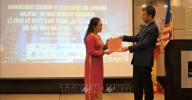
On the evening of August 27, the Malaysia-Vietnam Friendship Association held a solemn ceremony in Kuala Lumpur to announce the decision to establish and launch the Association's Executive Committee.
WAJ- Astronaut kelly - carrier 7% of the universal genes
- Ambassador Hans-Peter Glanzer: I would like to be perceived in the end, somebody also has deep sympathy for your country and for your people
- Unoosa and partners open next round of applications for microgravity experiments at the Bremen drop tower
- Vietnamese Ambassador to Vienna Praises Cooperation with Egypt
- Young translator conquers the ancient Greek classic Anabasis – Memoir of the Persian Expedition
- Austria news - Usama Nosshy channel covers Asean's 55th anniversary celebrations at the United Nations in Vienna
- VietnamPlus Newspaper reported about ASEAN's 55th anniversary at the United Nations in Vienna
MOST VIEWED
-
1
KAS Holdings: 30 Years of Building Trust and Connecting Korea – Vietnam

-
2
Emagazin: Expert's perspectives on economic development of Vietnam

-
3
The Saudi Embassy in Vienna celebrates the 94th National Day

-
4
The world where leaders live up to the values that they have promised to uphold !

-
5
Unoosa And United Kingdom release report on global space-related climate actions efforts

The two Kings Philippe and Van der Bellen havedifferent backgrounds, one is of royal origin, and the other is a child of a refugee family (once of noble origin) but now, in the eyes of the European public, both of them are giving off a sense of courtesy, virtue and erudition.
WAJWith the attendance of many international figures, the 80th anniversary of the end of World War II was celebrated at the United Nations headquarters.
Journalist Usama Soliman


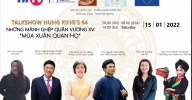
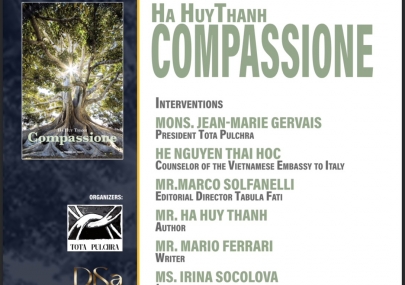
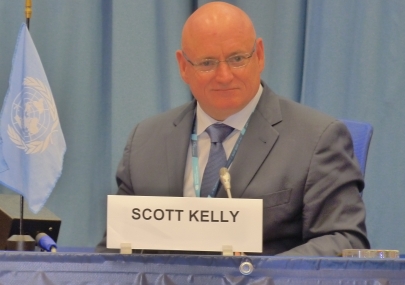

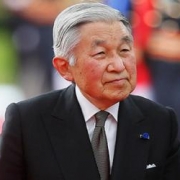







Comment